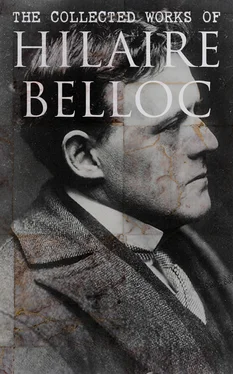But even so, the experiment was hazardous in the extreme. Had the surrounding governments which had witnessed and triumphed over his fall permitted him, as he desired, to govern France in peace, and France alone, this small part of the revolutionary plan might have been saved from the general wreck of its fortunes and of his. But such an hypothesis is fantastic. There could be and there was no chance that these great governments, now fully armed, and with all their organised hosts prepared and filled with the memory of recent victory, would permit the restoration of democratic government in that France which had been the centre and outset of the vast movement they had determined to destroy. Further, though Napoleon had behind him the majority, he had not the united mass of the French people. An ordered peace following upon victory would have given him such a support; after his recent crushing defeat it was lacking. It was especially true that the great chiefs of the army were doubtful. His own generals rejoined him, some with enthusiasm, more with doubt, while a few betrayed him early in the process of his attempted restoration.
It is impossible to believe that under such circumstances Napoleon could have successfully met Europe in arms. The military resources of the French people, though not exhausted, were reaching their term. New levies of men yielded a material far inferior to the conscripts of earlier years; and when the Emperor estimated 800,000 men as the force which he required for his effort, it was but the calculation of despair. Eight hundred thousand men: even had they been the harvest of a long peace, the whole armed nation, vigorous in health and fresh for a prolonged contest, would not have been sufficient. The combined Powers had actually under arms a number as great as that, and inexhaustible reserves upon which to draw. A quarter of a million stood ready in the Netherlands, another quarter of a million could march from Austria to cross the Rhine. North Italy had actually present against him 70,000 men; and Russia, which had a similarly active and ready force of 170,000, could increase that host almost indefinitely from her enormous body of population.
But, so far from 800,000 men, Napoleon found to his command not one quarter of that number armed and ready for war. Though Napoleon fell back upon that desperate resource of a starved army, the inclusion of militia; though he swept into his net the whole youth of that year, and accepted conscripts almost without regard to physical capacity; though he went so far as to put the sailors upon shore to help him in his effort, and counted in his effectives the police, the customs officials, and, as one may say, every uniformed man, he was compelled, even after two and a half months of effort, to consider his ready force as less than 300,000, indeed only just over 290,000.
There was behind this, it is true, a reserve of irregulars such as I have described, but the spirit furnishing those irregulars was uncertain, and the yield of them patchy and heterogeneous. Perhaps a quarter of the country responded readily to the appeal which was to call up a national militia. But even upon the eve of the Waterloo campaign there were departments, such as the Orne, which had not compelled five per cent. of those called to join the colours, such as the Pas de Calais and the Gers, which had not furnished eight per cent., and at the very last moment, of every twenty-five men called, not fifteen had come.
Add to this that Napoleon must strike at once or not at all, and it will readily be seen how desperate his situation was. His great chiefs of the higher command were not united in his service, the issue was doubtful, and to join Napoleon was to be a rebel should he fail—was to be a rebel, that is, in case of a very probable event. The marvel is that so many of the leading men who had anything to lose undertook the chances at all. Finally, even of the total force available to him at that early moment when he was compelled to strike, Napoleon could strike with but a fraction. Less than half of the men available could he gather to deliver this decisive blow; and that blow, be it remembered, he could deliver at but one of the various hosts which were preparing to advance against him.
He was thus handicapped by two things: first, the necessity under which he believed himself to be of leaving considerable numbers to watch the frontiers. Secondly, and most important, the limitations imposed upon him by his lack of provision. With every effort, he could not fully arm and equip and munition a larger force than that which he gathered in early June for his last desperate throw; and the body upon the immediate and decisive success of which everything depended numbered but 124,000 men.
With this force Napoleon proceeded to attack the Allies in the Netherlands. There was a belt of French-speaking population. There was that body of the Allies which lay nearest to his hand, and over which, if he were but victorious, his victory would have its fullest effect. There were the troops under Wellington, a defeat of which would mean the cutting off of England, the financier of the Allies, from the Continent. There was present a population many elements of which sympathised with him and with the French revolutionary effort. Finally, the allied force in Belgium was the least homogeneous of the forces with which he would have to deal in the long succession of struggle from which even a success at this moment would not spare him.
From all these causes combined, and for the further reason that Paris was most immediately threatened from this neighbouring Belgian frontier, it was upon that frontier that Napoleon determined to cast his spear. It was upon the 5th of June that the first order was sent out for the concentration of this army for the invasion of Belgium.
In ten days the 124,000 men, with their 370 guns, were massed upon the line between Maubeuge and Philippeville, immediately upon the frontier, and ready to cross it. The way in which the frontier was passed and the river Sambre crossed before the first actions took place form between them the preliminaries of the campaign, and must be the subject of my next section.
II
THE PRELIMINARIES: NAPOLEON’S ADVANCE ACROSS THE SAMBRE
Table of Contents
To understand the battle of Waterloo it is necessary, more perhaps than in the case of any other great decisive action, to read it strategically: that is, to regard the final struggle of Sunday the 18th of June as only the climax of certain general movements, the first phase of which was the concentration of the French Army of the North, and the second the passage of the Sambre river and the attack. This second phase covered four days in time, and in space an advance of nearly forty miles.
There is a sense, of course, in which it is true of every battle that its result is closely connected with the strategy which led up to its tactical features: how the opposing forces arrived upon the field, in what condition, and in what disposition and at what time, with what advantage or disadvantage, is always necessarily connected with the history of the campaign rather than of the individual action; but, as we saw in the case of Blenheim, and as might be exemplified from a hundred other cases, the greater part of battles can be understood by following the tactical dispositions upon the field. They are won or lost, in the main, according to those dispositions.
With Waterloo it was not so. Waterloo was lost by Napoleon, won by the Allies, not mainly on account of tactical movements upon the field itself, but mainly on account of what had happened in the course of the advance of the French army to that field. In other words, the military character of that great decisive action is always missed by those who have read it isolated from the movements immediately preceding it.
Читать дальше












